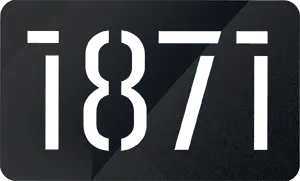By 1871 CEO Howard A. Tullman. To view the original post, visit http://www.inc.com/howard-tullman/impossible-is-a-good-place-to-being.html.
There’s a problem with the classic definition of insanity, which maintains that if you insist on doing things the same way you have always done them, it’s crazy to expect better or different results. Otherwise stated, it’s an acknowledgment that “to get what we’ve never had, we’re going to have to do what we’ve never done.” We hear a lot of this talk, but–especially in larger businesses– it’s mainly just that, a lot of talk and wishful thinking. And part of the reason may be that the traditional formulation has worn out its welcome. It’s not enough to present a different way of doing the same old things; to make a real difference, the new solutions need to be bigger, broader and better all-around.
One simple solution for the perception part of the problem may be for these traditional businesses to look at the way the smartest startups view the world. To the guys still sitting quietly in the C-Suites with their fingers and toes crossed hoping this web/digital thing will blow over before it blows up in their faces–especially during their time in the hot seat– I would say: if you really want things to stay the way they are, they’re gonna have to change. And change dramatically and change soon.
Analyzing past actions, present plans, capabilities and/or the actions of direct and obvious competitors isn’t a sufficient inquiry any longer. Incremental improvements may change the results by a few cents or goose this quarter’s market share, but they’re not going to alter the game. That’s just too narrow a perspective and far too limited an approach to succeed in the new world of global competitors– many of whom aren’t saddled with your legacy systems or the need to support the old enterprise offerings while the customers want tomorrow’s technologies.
In today’s disruptive and discontinuous world, this constricted view isn’t especially helpful or instructive because it has us looking backwards or laterally instead of looking ahead. Our job today is to desire, expect and demand more than what others–and the world at large– think is possible. At 1871, we like to say that if you don’t know it’s impossible, it’s that much easier to do. Things always seem impossible to the naysayers until they get done and then they belatedly seem obvious.
So, if we restrict ourselves to what has come before or benchmark ourselves solely against the known competition, we are limiting our opportunities to the shortcomings of those around us. That’s too low a bar. Just because they can’t or haven’t done something doesn’t remotely suggest that we can’t do much more. The past shouldn’t define the upper limits of what’s possible or achievable. The past is just what’s come before–supported and calcified by the tired and conventional wisdom.
There are countless ways that we fall into this mindset, but one that seems to be uncommonly common is the way we have historically sized up our competition and, more importantly, how we organize ourselves to address and deal with them. Large businesses have traditionally viewed their turf as zero-sum environments with the attitude that it is their job to grab as much market share away from their competitors as possible–it’s a “what’s mine is mine and what’s yours we can talk about” attitude. AT&T executives used to joke that they weren’t a monopoly, they just enjoyed 100% customer loyalty. They saw their world as a see-saw or a teeter-totter with compensating adjustments made over time among the players. It was a “nice” world– predictable, consistent, reliable. It was a world often governed by overt or indirect agreements as to price controls or price level maintenance that served the players’ interests in maintaining high prices and avoiding price wars, but rarely, if ever, benefitted the customers.
Today, almost every aspect of that world is over. The customer is in the driver’s seat and if you’re not meeting his or her needs, they’ll be gone in a flash. And those needs continually expand with a constantly rising bar. Good enough no longer is; the way you stay in the game is to get better all the time. And the competition looks a lot more like dodge’em cars than the see-saw because: (a) they’re coming at you from every direction, not in a linear or direct fashion, and (b) their approaches, offerings and multi-channel delivery systems are exploding. It’s not a fixed set of folks–it’s not a gentlemen’s game anymore– it’s every business for itself and everyone wanting your business as well.
I’ve described this new world of opportunities as one where there are so many new and different areas for aggressive and innovative companies to conquer that the real challenge is more about focus than anything else. You can extend your business into new areas, you can “slide to the side” into adjacent markets, you can offer alternatives to existing solutions– cheaper, faster, more accessible, etc.– and you can create entirely new markets and products and services based on the new tools, mobility and connectivity that we now have. (See: http://www.inc.com/howard-tullman/five-reasons-your-market-is-bigger-than-you-think.html.)
At 1871, we try to do it every day and we keep three objectives constantly in mind:
(1) Set Impossible Standards;
(2) Expend Extraordinary Efforts; and
(3) Achieve Remarkable Results.
Expect nothing less from yourself and your team and you’ll be surprised at how well things will work out.
Join as an 1871 Early Stage Member.
Attend info sessionSubscribe to our ICYMI newsletter.
Share this post:
